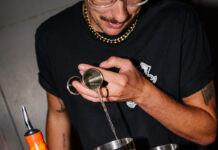Popularity of craft drinks set to continue, but serve and promotion are essential

PROMOTION and presentation are likely to be two of the most important factors in making the most of craft beer and spirits this year, say producers.
After what has been a tumultuous two years of trade, with businesses either forced to operate under restrictions or shut down altogether, craft producers said they expect bar and pub customers to be looking for quality when they are out in the on-trade in the coming months.
“With the easing of restrictions we feel that the percentage of consumers enjoying craft products when out and about will increase,” said Sonas Walker of Isle of Skye Distillers, the company behind Misty Isle Gin.
“Now that people are able to socialise in bars and pubs we feel that they will look to try the local product of that area, or other craft spirits that they have not yet had a chance to taste at home.
“We expect there to be a rise in the number of people enjoying craft spirits.”
This increase in demand could well prove to be good news for licensees, with craft products said to provide more generous profit margins than some of the more mainstream options.
“Craft is the fastest growing sub-category within the beer sector and in addition to its popularity, it also commands a higher price per pint, so should absolutely be considered by licensees,” said Crawford Sinclair, commercial director at Innis & Gunn.
The same is said to be true on the back-bar.
Dale McQueen, managing director of McQueen Gin, said: “Growing income from spirits sales is only possible by stocking something different, something a bit special.”
Introducing a selection of craft products isn’t enough on its own, however.
Producers said the more premium experience has to carry over into the standard of serve and service.
“Perfect serve is vital in terms of value for money and justifying the higher price point,” said Brewdog’s on-trade customer marketing manager, Ben Lockwood.
“For beer, that’s glassware and a great pour.
“Standard/unbranded glassware being used for all drinks in the category doesn’t help with elevating the experience for the guest or showcasing the quality of your craft options.”
Sinclair, at Innis & Gunn, agreed.
He said: “Ensuring that the craft beer drinking experience matches the higher price point is also essential.
“Branded glassware, outstanding beer quality and perfect serves will keep the consumer engaged and keen to explore and enjoy more.”
On the spirits side, serves should be high quality but not necessarily complicated, said brand owners.
“There is a return to classic cocktails which are simple to create and delicious to drink,” said Jo Jacobius of Dunnet Bay Distillers, producer of Rock Rose gin and Holy Grass vodka.
“High-end craft drinks lend themselves to these simple serves as the complexity in the spirits themselves means they need little adornment apart from the right basics: lots of ice, chilled glasses, and beautifully-presented and elegantly-garnished drinks.”
The way in which products are promoted – both internally and externally – is said to make a big difference in driving demand.
“Visibility of craft options is key,” said Sarah Stirton, marketing and customer experience manager at Stewart Brewing.
“If the consumer can’t see it they won’t buy it. Using point of sale materials and promos such as perfect serves are a great way to position the products in front of the customer in a gentle and digestible way, that are not a hard sell.”
Well-trained and informed staff can be another big difference-maker when it comes to selling craft products.
Sinclair at Innis & Gunn said that, as craft drinks have risen to prominence, “there are inevitably newcomers who want to engage, but feel they have a lack of understanding of what craft can deliver for them”. “Seeking more information from bar staff is likely a first step, so ensuring knowledgeable staff is a must,” he said.
That was echoed by Jacobius at Dunnet Bay, who said knowledgeable staff can “inform and enthuse consumers and give that all-important brand story because every craft drink has an interesting story to tell”.
“People like to know the tale behind the product,” she said.
And Walker at Isle of Skye Distillers said that product knowledge will make staff more confident in speaking to customers about particular drinks “and also help to up-sell the products”.
Outside of the venue, social media continues to be an invaluable tool for promoting craft products and serves, as well as highlighting a venue’s broader offer to potential customers.
Tina Connolly, senior brand manager at Amber Beverage UK, distributor of tequila brand Rooster Rojo, advised regular changes to drinks lists “featuring different craft drinks and cocktails that will appeal to your clientele and, above all, be Instagram-worthy”.
“Let your customers be your publicists,” said Connolly.



















